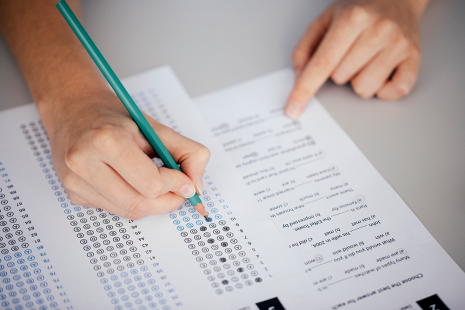Find out how to do a good interview using the STAR technique, get interview advice and preparation tips.
The interview is your chance to show the employer that you are the best person for the job. If you have been offered an interview, they are already interested in you. The interview is your opportunity to convince them.
You can do a lot before the interview to improve your chances of getting the job.
Use STAR and other interview techniques
Every question you answer needs to focus on showing employers that you are the right person for the job and that you can, or have the potential to, do the job.
STAR technique
What is the STAR technique?
STAR stands for Situation, Task, Action, Result.
The STAR technique is a way of answering interview questions where you provide a real example from your life or work to prove you have the skill they are asking for.
Think of situations and examples where you achieved success and apply this method to explain them.
S - Situation. Describe the situation, event, or the background to what happened. This should be the briefest part of your answer, one or two sentences.
T - Task. Explain the task you were given to do, or the work you needed to carry out. Briefly explain in one or two sentences what your role is, or what the challenge you face is.
A - Action. Explain exactly what you did to resolve the situation. This is likely to be a longer explanation.
R - Result. Describe the successful outcome or result of your actions. Explaining the result is very important. This is where you highlight your achievements. Make sure you choose situations that have a good outcome and a successful result. The idea of most answers is to show your successes, not your failures.
The STAR technique is also known by other names. Choose the one that you will remember the most easily under pressure:
- EAR – Event, Action, Result
- CAR – Context, Action, Result
- SCAR – Situation, Challenge, Action, Result
What questions is the STAR technique useful for?
The STAR technique is a method that teaches you how to answer competency or behavioural interview questions. Competency questions are when an interviewer asks you to give a real-life example of how you have used your skills.
Think of examples from your life, work whether paid or unpaid, training and hobbies:
- What do you do on a typical day at work, when volunteering, doing work experience, training or doing hobbies?
- What help do you give the people that are part of your work or life?
You can recognise a competency question as they usually start with:
- Describe a…
- Give an example of when you…
- Tell me about a time…
- How do you…
- Explain how you…
- What do you do when…
SET technique
What is the SET technique?
SET Stands for Skills (and strengths), Experience and Training. These three things are the main areas employers want you to focus on in your answers.
S – Skills and strengths. What are you good at? What good things would your previous employer have said about you? What do your friends and family say you are good at?
E - Experience. What tasks have you done that match the tasks in the job description?
T - Training. What training have you done that the job is asking for? What relevant qualifications do you have?
When to use the SET technique
Use the SET technique and explain your strengths, experience, and training when you get questions like:
- Tell me about yourself
- Why do you want this job?
- Why should we employ you?
Employers will expect some repetition. In fact, they might remember your skills better when you repeat them.
Explore top job interview questions and example answers
Match your skills to the job description
Before the interview read your CV or application, and the job description. The job description gives you the clues to the kinds of questions you are likely to be asked.
If you no longer have access to the job description look for similar jobs on job websites or use our Job Information to look at skills they might ask for in that job.
Make a note of the skills, experience and training mentioned in the job description. Compare them to the skills, experience and training you have that match the job description. Think of situations where you have used those skills and had a successful result. Apply the STAR or SET technique.
Research the company
Employers will expect you to know information about their company. One of the questions often asked in interview is ‘What do you know about us?’
The information that is important to find out if possible is:
- What the company does. They often have sections on their website called ‘About us’ which will tell you about the company
- Information about the interview panel if known. When you are invited to interview you might be told who is on the panel. If you are given names look them up on LinkedIn to find out more about them
- News articles that feature the company, especially any plans they have to expand, new products, or positive press
- Advertisements or campaigns that promote their company
Find out information from company websites, Facebook pages or other social media accounts, news websites and searching the internet. Sometimes there will be information about the company in the job vacancy you applied for too.
Find out the details of the interview
Find out:
- What type of interview it will be. Is it in person or by video or telephone? Is it a group interview?
- The location of the interview if it is an in-person interview
- If there will be an assessment or test, and if so what kind of assessment?
- If you need to give a presentation. If you do, find out if they will give you the topic in advance so you can prepare. Do they require you to email them the presentation in advance or can you bring a USB key?
- What equipment is available, for example a computer for a PowerPoint presentation.
- If you need to confirm your attendance at the interview, and if you do, do they require you to email, phone or post them confirmation?
- If you need any reasonable adjustments and if so how to let the employer know
Do’s and don’ts of answering interview questions
Follow these tips when answering interview questions:
- Be honest and use situations from your own work and life. Get help from people you work with or family and friends about what you have achieved if you can. Sometimes they may remember things you don’t
- Don’t copy other people's work, and don't make up examples
- Practice interview answers aloud before the interview
- Prepare answers for questions to common interview questions in advance
- Remember your body language is important. Smile, sit up straight and make eye contact with the interviewer/s
- Speak clearly and try not to talk too quickly
Get support
Our careers advisers and employability coaches can help you prepare for interviews.
Contact us for more help and support.
Explore

Explore top interview questions and example answers using the STAR and SET techniques. Get tips for how to answer common questions.

Get help to prepare for video and telephone interviews. Preparing for video and telephone interviews is as important as it is for face to face interviews.

Find out about selection and psychometric tests that are often part of job interviews. Get tips on how to prepare and where to find practice tests.

Learn how to create your CV, find out what to include in your CV, view our free CV templates, and download our guide to CV writing.

Get tips on how to write an application to get you an interview.

Make a good first impression in your covering letter or email with our help.

Find out about the support available to help you into work if you are disabled or have a health condition.

